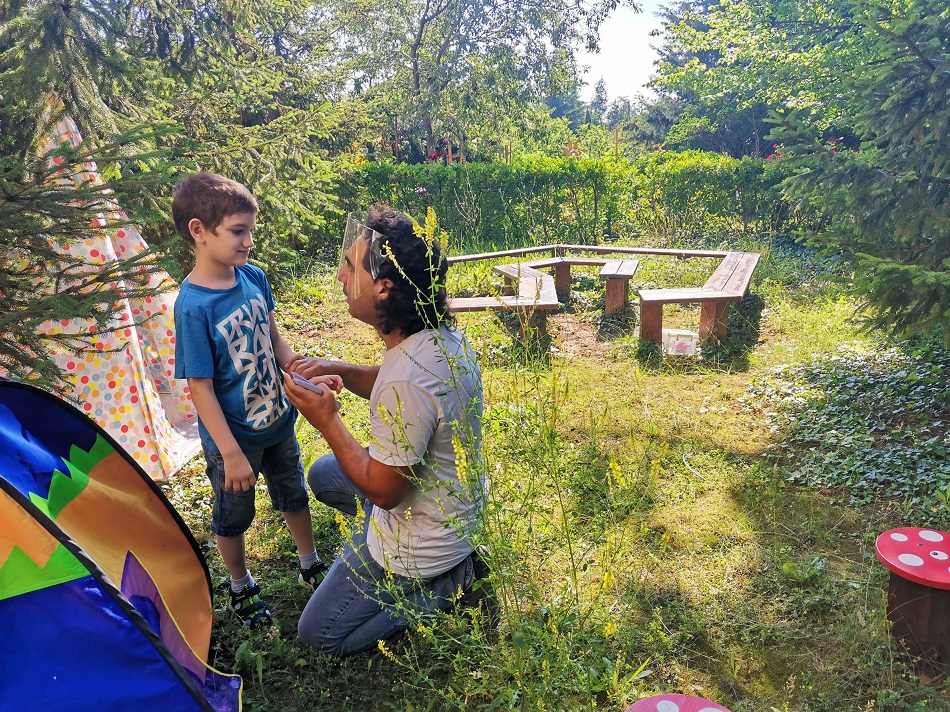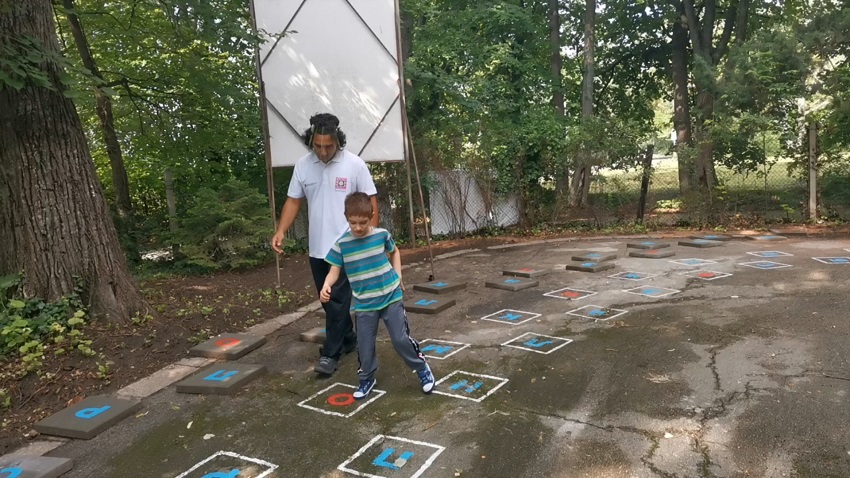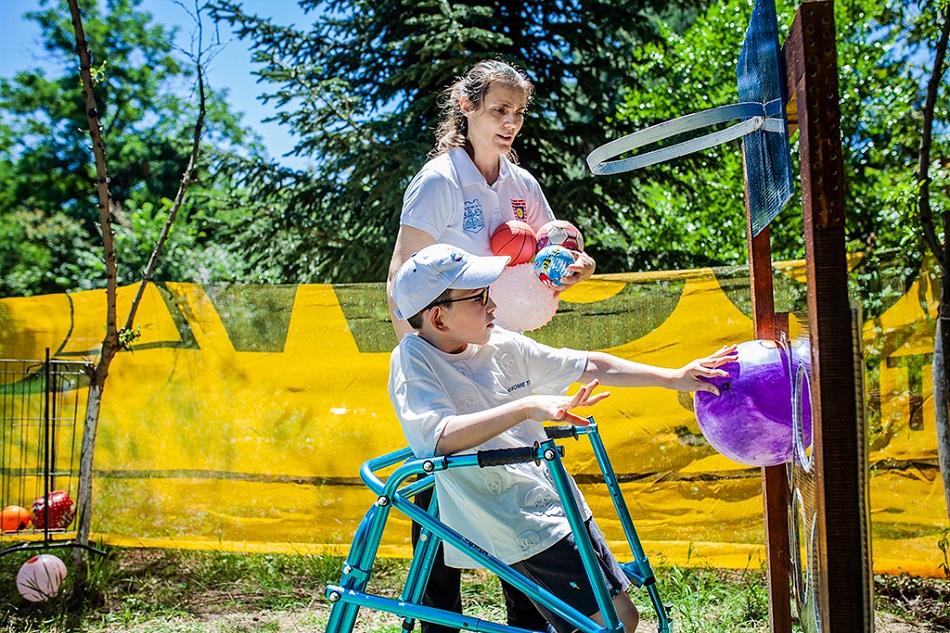Multisensory educational garden
Basic information
Project Title
Full project title
Category
Project Description
The Montessori team of Karin dom Foundation accepted the challenge to create an educational space filled with many incentives that help children gain sensory experience and support the process of sensory integration.This is first of a kind multi-sensory garden in Varna region that is designed also to support the development of children with special needs. The multi-sensory garden provides opportunities for specialists and parents to understand and correctly interpret children's behavior.
Project Region
EU Programme or fund
Description of the project
Summary
Sensory integration is a major factor influencing early childhood development.Successful adaptation, communication and dealing with all the rules, situations and requirements in a structured learning environment are major challenges for every child.To cope with them, the child needs sensory experience and knowledge of his own body and the world around him.Knowledge of the process of sensory integration in norm and pathology is an important factor for the successful work with children and students with special educational needs and a condition for their successful inclusion.Those working with children with learning difficulties, a huge percentage of whom have impaired sensory processing to varying degrees, need theoretical and practical training to know and meet their specific needs.The multi-sensory garden of Karin dom, with 30 zones for development, is an innovative and first of its kind site in the region of Varna for sensorimotor development of children.The site is built in the spacious yard of Karin dom in the Sea Garden of Varna, which further affects the general health and psycho-motor development of children through the impact of environmental factors and natural stimuli.In Bulgaria, there is still a significant lack of sufficiently specialized sites and facilities especially aiming at sensory integration.The mass facilities also develop to some extent the sensory of children, but do not meet the special needs of all children.A significant problem is that more often there are problems in the sensory development of children, which leads to the search for and application of new ways and techniques for impact.Sensory development is the basis of children's learning at an early age and an important factor for their overall development further.The project creates an innovative space for outdoor activities, contributes to the changing attitudes towards children with special needs and their families and encourages the overcoming of sensory deficits in children.
Key objectives for sustainability
The multisensory garden follows the 3 main pillars for sustainable development:
- Sustainability for the personality in the future–the purpose of the garden is a sustainable interdisciplinary learning model and support for the young child. The basis of this sustainability is the perception that the little person acquires knowledge about the world through natural activities–play, adventure and sensory experience.We have developed the construction of this sustainable process of learning in the garden according to the principles of Montessori pedagogy where one of the main emphasis is the communication of children with nature and its connection with it.Through contact with nature, the child understands its “order, harmony and beauty”.According to the Montessori system, movement, and in particular the handling with hands due to tactile receptors for sensing matter and perception of the surrounding world,are extremely important for the development of intelligence.Through the Training center we disseminate the model to other specialists in kindergartens,nurseries and centers for social services.
- Social sustainability–activities in Karin dom’s garden aims to develop the social and team work skills as well as acceptance and inclusion of children with special needs.The garden is used together by all children, no matter they have special needs or not – these are the children who visit Karin dom for therapy and the children who attend the Montessori kindergarten at Karin dom.They all play, learn and develop together aiming at acceptance and cohesion.
- Economic sustainability–The model provides a great opportunity for learning and therapeutic activities for children with special needs in a pandemic and effective use of the available basic resources such as land,materials,human capital and knowledge.The construction model and the applied model of learning are offered to other organizations in the form of paid trainings,which contributes to Karin dom’s financial independence.
Key objectives for aesthetics and quality
- Aestetic in terms of combining materials for work and play. Karin Dom is an Eco school and a holder of a ”Green Flag” from the Foundation for Environmental Education. RE-use and Re-cyle thinking and living lie in our mission and activities. In this regard, the multisensory garden gives a “second life” to products and materials (ex. pallets, tires) in a green and lovely way that enriches children’s understandings, values and care for the environment.
- The natural classroom and the feeling it creates in children – it is a place which develops children imagination and supports their good physical condition and health. In the natural classroom children easily acquire and consolidate knowledge and skills in botany, mathematics, language and speech, biology, physics and chemistry. In the Montessori system, which is the base of the multisensory garden, one of the main highlights is the communication of children with naure and their connection with it. According to Maria Montessori “the child should have the opportunity to communicate with the Nature. In this way he will learn how to understand and appreciate its order, harmony and beauty.
- The herb garden with its forms and symmetry – it forms a sense for the beautiful design of the space. The multisensory garden gives an opportunity for children to learn how to cultivate environmentally friendly food – fruits, vegetables, spices and herbs.
Key objectives for inclusion
Awareness of sensory integration helps parents and people working with children to understand and correctly interpret details of children’s behavior and the difficulties they experience in performing certain actions. Awareness of sensory integration also supports the process of adaptation to the everyday and routine activities so children get a sensorimotor experience that satisfied their needs.
In Bulgaria, there are many areas designed only for children with typical development, and specialized playgrounds for children with special needs still remain either scarce or too isolated. There are no combined spaces where children with typical development and those with special needs can play and develop through joint activities. Sensory development is in the basis of children’s learning at an early age and important factor for their overall further development. This sensory platform for active joint activities and therapy will improve the adaptive skills of children, which will increase their skills and facilitate their transition to nursery, kindergarten and school.
The project seeks a social effect – the families of children with typical development and children with special needs have the opportunity to meet, communicate and play together in the same environment, appropriate for age development and enabling inclusive education. The project creates a prerequisite for improving the quality of life offering equal opportunities for children with special needs and supporting the social integration of their families by supporting and raising the level of public awareness.
Results in relation to category
- Introduced innovative, interdisciplinary educational model by creating an innovative, combined outdoor playground for all children aged 0-3 and 3-9 and their families - children with typical development, with motor difficulties, mental retardation, sensory difficulties, children with autism spectrum disorders, etc.;
- Through the project, Karin dom support and develop the interdisciplinary model by working on developing knowledge from several other fields such as psychology, Montessori education, pedagogy, physiotherapy, etc.
- Through appropriate sensory stimuli children improve coarse and fine motor skills and social interaction with other children;
- It is easier for them to play with other children in kindergartens, which definitely favor their smooth transition to inclusive education and facilitate their inclusion in common play and activities in the mainstream education system;
- The knowledge, skills and habits that build children with special needs in therapeutic rooms and sessions are able to integrate and develop functionally in a protected outdoor environment;
- Children are provided with various sensory experiences and stimuli through play, which, with proper dosing and consistency, develop their abilities and skills.
How Citizens benefit
How does the community benefit from the project?
- Children with special needs-the need for self-stimulation and self-harm is reduced;the quality of attention is improved and aspiration for participation in activities and learning is generated;independence in functional activities is achieved;spontaneous manifestations of new skills and abilities are stimulated;social interactions and communication are improved;fear and anxiety are reduced;
- Parents and specialists working with children–Awareness of sensory integration helps parents and professionals to understand and correctly interpret some details of children's behavior and the difficulties they experience in performing certain activities;they are now able and have the knowledge to organize the environment and activities that meets his sensory needs;anxiety and stress are reduced and patience is trained;
- Inclusion and developmental opportunities–Sensory integration is a major factor influencing early childhood development.Knowledge of the process of sensory integration is an extremely important factor for the successful work with children and students with special educational needs and a condition for their successful inclusion.By providing information and expertise through trainings,Karin dom empowers specialists,parents and the community to know about the characteristics of sensory integration and its importance for capacity development.It also leads to wide awareness and knowledge of the introduction of such activities in general nurseries,kindergartens and schools to promote social and educational inclusion.In the long run this leads to the building of a tolerant,concerned and informed society,as well as to the creation of preconditions for the smooth inclusion of children and their transformation into worthy members of society.
Innovative character
The multi-sensory garden of Karin dom is an innovative and first of its kind site for sensorimotor development of children aged 0-3 and 3-9 in the region of Varna, with a focus on children with special needs. The site is built in the spacious yard of Karin dom in the Sea Garden of Varna, which further affects the general health and psycho-motor development of children through the impact of environmental factors and natural stimuli. In Bulgaria there is still a significant lack of sufficiently specialized sites and facilities especially aiming at sensory integration. A significant problem is that more and more often there are problems in the sensory development of children, which leads to the search for and application of new ways and techniques for impact. As a result, the project creates an innovative space for active exercises and outdoor activities, contributes to changing attitudes towards children with special needs and their families and encourages the overcoming of sensory deficits in children.



